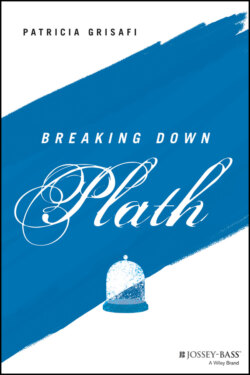Читать книгу Breaking Down Plath - Patricia Grisafi - Страница 14
MEETING TED HUGHES
ОглавлениеWhen Sylvia met Ted Hughes in 1956, he had published a few poems in university publications and already was garnering a reputation for powerful and violent poetry about the natural world and human relationships. When the two first met in 1956 at a wild party famously recounted in Plath's journals, she recited bits of his poetry to him. Then, they passionately kissed and Hughes snatched Plath's headband and earrings: “I was stamping and he was stamping on the floor, and then he kissed me bang smash on the mouth and ripped my hairband off…and when he kissed my neck I bit him long and hard on the cheek” (Unabridged Journals, 2000, p. 212).
Plath believed she had finally met her equal—someone who was smart, strong, creative, and passionate about writing—but the relationship was often volatile. They married after four months in a quiet ceremony and kept the marriage secret (Plath was worried she might lose her Fulbright if the marriage was discovered). The marriage was exceptionally literary from the get‐go. Plath and Hughes settled into a routine of writing and reading each other's work. Much of the time, however, Hughes would write and Plath would act as his secretary, sending out his poetry. He even won an important poetry contest that he didn't know Plath entered on his behalf. However, Hughes did support Plath's writing goals and encouraged her to write. In this way, the two had a more equitable artistic partnership than most.
In the 1950s—even in progressive artistic circles—there was still a sense that men dominated the world of work. Mostly, women were relegated to a more domestic experience: providing support for their husband, taking care of the home, and raising the children. It might be seen as a bonus to have a clever wife who would write sometimes. But Plath bristled against losing her identity as a writer to household drudgery.
In 1957, Plath and Hughes moved to back to the United States to pursue jobs in education. They settled in Massachusetts, and Plath began teaching English at her alma mater, Smith College. Although she was regarded as a good professor, Plath felt that teaching took her away from achieving success as a writer. Both she and Hughes decided to dedicate themselves to writing from then on and only take jobs that could allow them to focus on that goal. At this time, Hughes' poetry collection The Hawk in the Rain had been well received by American poets, and Plath and Hughes were invited to mingle with Boston's literati.
Plath took two part‐time jobs and began auditing classes in Boston taught by well‐regarded and eccentric poet Robert Lowell. This class exposed Plath to yet another kind of writing: “confessional” poetry. Confessional poets like Lowell, John Berryman, and Allen Ginsberg wrote about their personal experiences in explicit terms, often breaking social taboos by writing about sexuality, trauma, or addiction in the first person. Lowell's poetic use of “I” blurred the lines between the writer and the speaker of the poem, inspiring Plath to continue playing with the relationship between art and personal experience. While taking Lowell's class, Plath met fellow poet Anne Sexton. Sexton, who had begun writing poetry after having a nervous breakdown, was flamboyant and open—and she was an important up‐and‐coming poet. Plath and Sexton became friendly and would go out for drinks at the Ritz to talk about poetry and about their struggles with mental illness. As we will explore further in Chapter 3, Sexton became an influence on Plath's poetry.
During this time, Plath was trying to figure out how to move forward in her life as a poet and also become a mother. In 1960, Plath discovered she was pregnant, and she and Hughes decided to move back to England and rent a London apartment. A big year of both successes and setbacks lay ahead. On February 10, 1960, Plath signed a contract for her first book of poetry: The Colossus and Other Poems. A few months later, Plath's daughter Frieda was born. Plath became pregnant again later in the year but had a miscarriage followed by appendicitis. In a letter to Dr. Beuscher, Plath explained that prior to the miscarriage, Hughes had hit her: “Ted beat me up physically a couple of days before my miscarriage: the baby I lost was due to be born on his birthday. I felt this an aberration, & felt I had given him some cause, I had torn some of his papers in half.” Later, Plath would indicate that Hughes also verbally and emotionally abused her as their marriage became strained.
